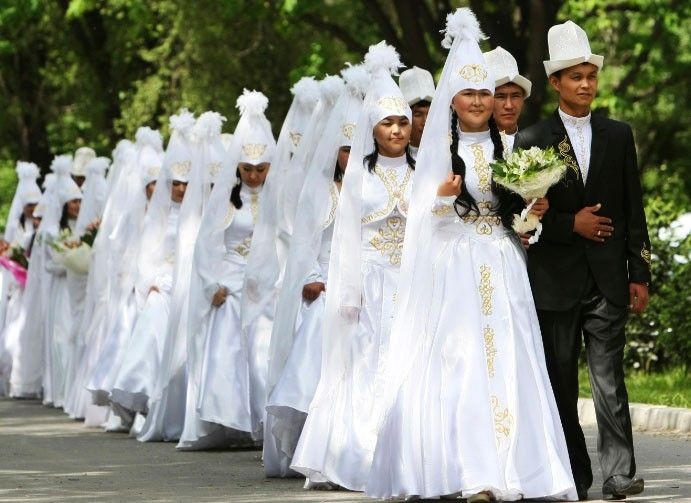Kyrgyzstan To Decide Whether Kidnapping Women Is A Serious Offense

The Kyrgyzstan parliament is in the midst of a heated debate over a sensitive issue: whether three years in prison is punishment enough for a man who kidnaps a woman and keeps her for life.
Bridal kidnapping is common in this Central Asian country, even though it is technically illegal. Perpetrators are currently at risk of paying a fine or serving up to three years behind bars, and now, opponents of the practice want to raise the maximum sentence to seven years.
“It is outrageous,” says Rimma Sultanova, who works with the Women’s Support Center in the capital city of Bishkek, according to the BBC. “The punishment for cattle-stealing is 11 years and for abducting a girl is maximum three years.”
But defenders of bride kidnapping argue that it would be wrong to punish men for doing what their ancestors have done for generations.
The practice is rooted in centuries of tradition, and is especially prominent in rural areas of Kyrgyzstan. Men seeking a bride will surprise the object of their affection with a sudden abduction, forcefully whisking the victim away. The groom’s family members are typically stationed at his home when the bride-to-be arrives; their purpose is to welcome the young woman and convince her to spend the night there. If she acquiesces, it is assumed that she will stay there for good as her kidnapper’s betrothed.
In some situations, the bride-to-be is in on the scheme, and the kidnapping functions as a sort of surprise proposal. But often, the women are caught wholly unawares. Some wives are entirely unacquainted with their husbands until their abductions. Some have boyfriends of their own, whom they are summarily forced to abandon.
It is considered normal – even honorable – for kidnapped brides to resist their abductors. But once they arrive at the groom’s house and are greeted by cajoling family members, most abductees resign themselves to their fate.
Kyrgyzstan, a former Soviet republic of 5.5 million nestled between the towering Tian Shan and Pamir mountain ranges, has a weak economy and few natural resources. It is one of the former Soviet Union's poorest nations. Two decades of corrupt administrations have stifled progress, leading up to public protests in April 2010 that overthrew then-President Kurmanbek Bakiyev. From that time until current President Almazbek Atambayev was elected to office in December 2011, a woman headed the interim government: longtime opposition leader Roza Otunbayeva.
During her brief tenure as president, Otunbayeva spoke out against marriage abductions.
“Around 15,000 women each year become the victims of bride kidnapping,” she said, according to AFP. (This estimate is much higher than the national ombudsman’s figure of 8,000.)
“Bride kidnapping is a tradition of the Kyrgyz people, but these crimes often force women to commit suicide,” Otunbayeva added.
The laws that do exist are often ignored. Almost all bride kidnappers get away with their crimes, since it is up to victims – the brides – to file charges. But respect for old traditions and a fear of social shaming prevents most abducted women from alerting the authorities.
The bill currently being debated in parliament is significant not only because it would raise the maximum sentence to seven years, but also because it would turn kidnapping into a more serious offense. This would enable law enforcement to target abductors themselves, without a formal complaint from the victim.
Kyrgyz politicians on both sides of the bill suspect that even if it passed, things wouldn’t change much on the ground. But supporters argue that if the legislation is passed, even symbolically, it could send an important message that furthers the fight against bridal kidnapping.
As Otunbayeva explained simply, “The country has laws that must protect young girls.”
© Copyright IBTimes 2024. All rights reserved.





















